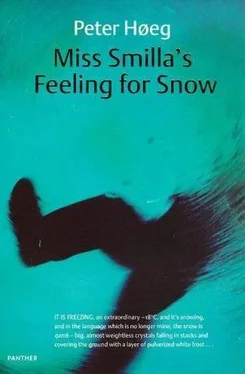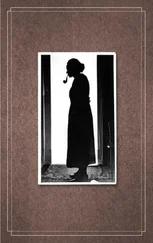Peter Høeg - Smilla's Sense of Snow aka Miss Smilla's Feeling for Snow
Здесь есть возможность читать онлайн «Peter Høeg - Smilla's Sense of Snow aka Miss Smilla's Feeling for Snow» весь текст электронной книги совершенно бесплатно (целиком полную версию без сокращений). В некоторых случаях можно слушать аудио, скачать через торрент в формате fb2 и присутствует краткое содержание. Жанр: Современная проза, на английском языке. Описание произведения, (предисловие) а так же отзывы посетителей доступны на портале библиотеки ЛибКат.
- Название:Smilla's Sense of Snow aka Miss Smilla's Feeling for Snow
- Автор:
- Жанр:
- Год:неизвестен
- ISBN:нет данных
- Рейтинг книги:3 / 5. Голосов: 1
-
Избранное:Добавить в избранное
- Отзывы:
-
Ваша оценка:
- 60
- 1
- 2
- 3
- 4
- 5
Smilla's Sense of Snow aka Miss Smilla's Feeling for Snow: краткое содержание, описание и аннотация
Предлагаем к чтению аннотацию, описание, краткое содержание или предисловие (зависит от того, что написал сам автор книги «Smilla's Sense of Snow aka Miss Smilla's Feeling for Snow»). Если вы не нашли необходимую информацию о книге — напишите в комментариях, мы постараемся отыскать её.
Smilla's Sense of Snow aka Miss Smilla's Feeling for Snow — читать онлайн бесплатно полную книгу (весь текст) целиком
Ниже представлен текст книги, разбитый по страницам. Система сохранения места последней прочитанной страницы, позволяет с удобством читать онлайн бесплатно книгу «Smilla's Sense of Snow aka Miss Smilla's Feeling for Snow», без необходимости каждый раз заново искать на чём Вы остановились. Поставьте закладку, и сможете в любой момент перейти на страницу, на которой закончили чтение.
Интервал:
Закладка:
Just as they know where I am. That's the advantage of the laundry room. It sounds as if I'm there even when I'm not.
Urs is eating. He has pulled out a folding table next to the stove, spread a cloth over it, set the table, and lit a candle. "Fraulein Smilla, attendez-moi one minute."
The crew's mess on board the Kronos is a Tower of Babel of English, French, Tagalog, Danish, and German. Urs drifts helplessly among fragments of languages he has never learned to speak. I sympathize with him. I can hear that his mother tongue is disintegrating.
He pulls up a chair for me and puts down a plate. He likes company when he eats. He eats as if he'd like to unite the peoples of the world around his pots and pans, with the optimistic knowledge that we all have a need to feed ourselves despite wars and rape and language barriers and differences in temperament and the Danish military's exercise of sovereignty over North Greenland, even after Home Rule.
On his plate he has a portion of pasta that is big enough for two.
He gives me a melancholy look when I decline. "You are too thin, Fraulein."
He grates a big piece of Parmesan cheese; the dry golden dust drifts down over the pasta like snow flurries. "You are ein Hungerkiinstler, a hunger artist."
He has slit his homemade baguettes lengthwise and warmed them up with butter and garlic. He stuffs four inches at a time into his mouth, chewing slowly and with pleasure.
"Urs," I say, "how did you happen to sign on?"
I can't imagine being on more formal terms with him. He stops chewing. "Verlaine says that you're Polizist." He considers my silence. "I was im Gefdngnis, in prison. For two years. In der Schweiz."
That explains the color of his skin. Prison pallor.
"I was on a driving tour of Morocco. I thought that if I took five pounds along, I'd have enough for two years. At the Italian border they pulled me over at random. I got three years. Released after two. In October of last year."
"How was prison?"
"Die beste Zeit meines Lebens." Emotion has made him switch over to German. "The best time of my life. No stress. Only Rube, peace. I did voluntary kitchen duty. That's why I got Strafermitssigung, a reduction in sentence."
"And the Kronos?"
Once again he considers my intentions. "I did my military service in the Swiss Navy."
I wonder whether this is supposed to be a joke, but he stops me with a gesture of his hand.
"Flussmarine, the river patrol. I was a cook. One of my colleagues has connections in Hamburg. He recommended the Kronos. I did part of my apprenticeship in Denmark, in Tonder. It was difficult. It's hard to find work when you've been in prison."
"Who hired you?" He doesn't answer. "Who is Tørk?"
He shrugs. "I've only seen him once. He stays up on the boat deck. Seidenfaden and die Frau are the ones who come out."
"What are we going to pick up?"
He shakes his head. "I'm just the cook. It was impossible to find work. You have no idea, Fraulein Smilla…"
"I want to see the walk-in coolers and the storage rooms."
There is fear in his expression. "But Verlaine told me that Jaspersen would…"
I lean across the table. In this way I force him away from his pasta, away from our previous intimacy, from his trust in me.
"The Kronos is a smuggler ship."
Now he's panic-stricken. "Ahh, ich bin kein Schmuggler. I couldn't stand going back to jail."
"Wasn't it the best time of your life?"
"Once was enough."
He takes me by the arm. "I don't want to go back. Bitte, bitte. If we're caught, tell them I'm innocent, that I don't know anything."
"I'll see what I can do."
The food storerooms are right under the galley. They consist of a meat locker, a freezer for eggs and fish, a double-cooler kept at 36°F for other perishable goods, plus various cupboards. The whole area is well stocked, clean, orderly, functional, and subject to such constant use that it would be no good as a hiding place for anything.
Urs shows me the area with equal parts professional pride and fear. It takes ten minutes to inspect. I'm on a schedule. I go back to the laundry room, spin dry the clothes, stuff them in the dryer, and turn the dial back to Start. Then I sneak out again. And head below.
I don't know a thing about engines. And what's more, I have no intention of learning about them, either.
When I was five years old, the world was incomprehensible. When I was thirteen, it seemed to me much smaller, much dirtier, and depressingly predictable. Today it still seems muddled, but once again-although in a different way-as complex as when I was a child.
With age I have voluntarily chosen certain limitations. I don't have the energy to start over again. To learn new skills or fight my own personality or figure out diesel engines.
I rely on Jakkelsen's off-hand remarks. This morning I surprised him in the laundry room, sitting with his back against the insulation on the hot-water pipe, with a cigar in his mouth and his hands in his pockets so the salt air won't sneak in and damage his peach-soft skin that's supposed to be used for stroking the ladies' inner thighs.
"Smilla," he says when I ask him about the engine, "it's enormous. Nine cylinders, and each is 18 inches in diameter, with a 29-inch stroke. Burmeister and Wain direct reversible, with supercharger. We're sailing at 18 to 19 knots. It's from the sixties, man, but it's been renovated. We're outfitted as an icebreaker."
I stare at the engine. It's looming up before me; I have to walk past it, with its injection valves, fuel cocks, radiator pipes, springs, polished steel and copper, its exhaust manifold, and its lifeless yet dynamic motion. Like Lukas's little black telephones, the engine is a distillation of civilization. Something that is both taken for granted and incomprehensible. Even if I had to, I wouldn't know how to stop it. In a certain sense, maybe it can't be stopped. Temporarily interrupted perhaps, but not permanently brought to a standstill.
It may give this impression because, unlike a human being, it has no individuality; it's a replica of something else, the soul of the machine or the system of axioms underlying all machines.
Or maybe it's a mixture of loneliness and fear that's making me see visions.
But I still can't explain the essential thing: Why was the Kronos outfitted two months ago in Hamburg with a vastly oversized engine?
The hatch in the bulkhead behind the engine is insulated. When it falls shut behind me, the noise of the engine vanishes and my ears ring deafly. The tunnel goes down six steps. From there the corridor stretches twentyfive yards, straight as an arrow, lit by wire-wrapped lamps-an exact copy of the stretch that Jakkelsen and I covered less than twenty-four hours ago, although now it feels like the distant past. '
The diesel tanks below deck are marked with numbers on the floor. I pass numbers 7 and 8. On the wall, next to the location of each tank, there is a foam extinguisher, a fire blanket, and an alarm button. It's not pleasant being reminded about the dangers of fire on board ship.
At the end of the tunnel a spiral stairway leads upward. The first hatch is on the left-hand side. If my provisional measurements are right, it goes to the smallest cargo hold farthest aft. I move past it. The next hatch is ten feet higher up.
The room is different from what I'd seen before. It's no more than twenty feet high. The sides don't go all the way up to deck level but stop at the between decks, where the beam of my flashlight disappears in the darkness.
The room is a peeling, spotted, and much-used cargo hold. Wooden wedges, hemp ropes, and sacks used for moving and securing cargo are piled up against one bulkhead.
Against the other bulkhead about fifty railroad ties are stacked up and strapped down.
Читать дальшеИнтервал:
Закладка:
Похожие книги на «Smilla's Sense of Snow aka Miss Smilla's Feeling for Snow»
Представляем Вашему вниманию похожие книги на «Smilla's Sense of Snow aka Miss Smilla's Feeling for Snow» списком для выбора. Мы отобрали схожую по названию и смыслу литературу в надежде предоставить читателям больше вариантов отыскать новые, интересные, ещё непрочитанные произведения.
Обсуждение, отзывы о книге «Smilla's Sense of Snow aka Miss Smilla's Feeling for Snow» и просто собственные мнения читателей. Оставьте ваши комментарии, напишите, что Вы думаете о произведении, его смысле или главных героях. Укажите что конкретно понравилось, а что нет, и почему Вы так считаете.




![Рута Шепетис - Ashes in the Snow [aka Between Shades of Gray]](/books/414915/ruta-shepetis-ashes-in-the-snow-aka-between-shades-thumb.webp)







